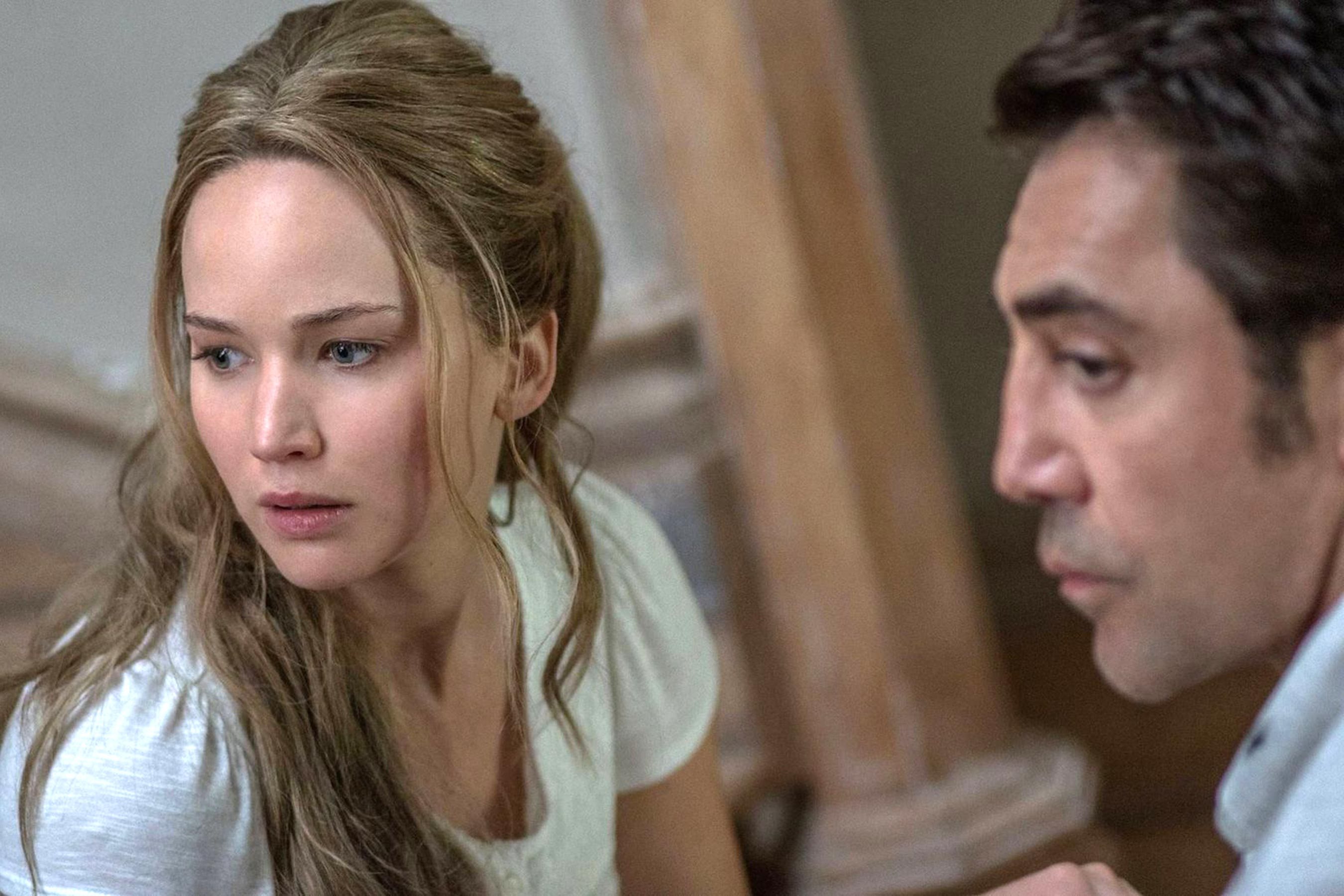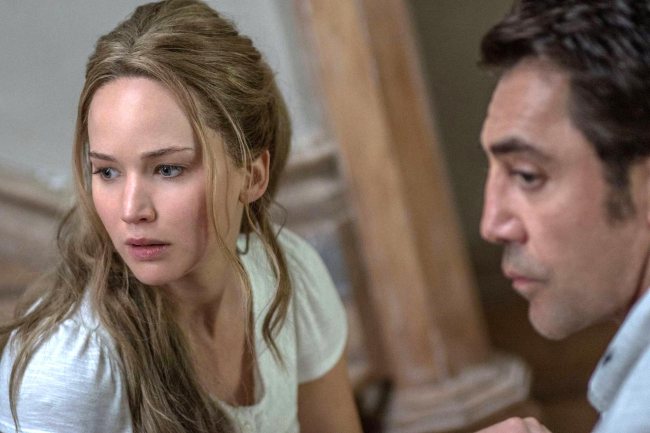Review: Reports of mother!‘s Terribleness Have Been Greatly Exaggerated
4/5 stars.


Consider this review your spoiler-free trigger warning.
When I decided to see mother! this weekend, I wasn’t sure what to expect. I was hearing things that were not so great. I heard that this movie was going to “upset the fuck out of people” (according to Anthony Bourdain). I heard the word misogyny and immediately cringed.
I read early reviews and people warned that it was a “grandiose and self-aggrandizing” work about a male artist and his wife, using it as a springboard from which to speculate about Aronofsky’s real-life relationship with lead actress Jennifer Lawrence. That is, when reviewers said it was “about” anything at all. Many, like Variety’s Owen Glieberman, seem to think that it’s all flamboyance, but that “There’s no subtext to mother!—just the film’s hyper-synthetic, flattened-out pop reality.”
When I saw it for myself, however, I saw something else.
It’s difficult to talk about this movie without getting into spoiler territory, but I will do my best. Before I can talk about what the film is, though, I have to talk about what it’s not:
- It’s not a “horror film,” though horrific things happen. This film was marketed terribly in large part thanks to Aronofsky’s desire to have people experience the film without preconceived notions. However, people now have different preconceived notions because they’re going in thinking they’re going to see the film they saw advertised, rather than the film that actually exists.
- It’s not the story of “a poet and his wife,” nor is it a “meditation on motherhood.” I mean, it is, but it’s not. Yes, it’s an allegory—one that means something very specific to Aronofsky, but one that is also open to interpretation, as most good allegories are. Animal Farm is about totalitarianism. It could just as easily be about high school. Death of the Author, and all that.
- It’s not misogynistic (though I’m sure there will be plenty of people who disagree with me on that score), just as it’s not the story of an actual poet and his actual wife—not the story of a man and a woman at all. Though the fact that Jennifer Lawrence’s character is a woman and Bardem’s character is a man is very purposeful, the fact is that what happens in the story isn’t actually gendered. Gender is what we’ve come to attach to it.
- It’s not easy entertainment. This is not a film that you go and see because you want to shut your brain off. You need to come into the theater with your brain fully charged and ready to go.
This film is also not for everyone.
As I said, it’s not a horror film, but horrific things happen, which are harrowing to watch. There are two scenes in particular toward the end that are immensely disturbing. If you don’t do well with violence (specifically against a woman, or against children), this is not the movie for you, and you should know that.
However, you should also know that the violence I’m talking about very much has a purpose that is integral to the film, especially if looked at through a particular lens. If you can stomach filmed violence at all, so long as it isn’t oppressive in nature (ie: against marginalized people), gritting your teeth through it might be worth it to you for the greater overall experience with the story.
That said, it’s also not for people that don’t want to have any kind of thinky-thoughts when they go to movies. This film isn’t escapism. There’s nothing wrong with escapism; I’m a huge fan of escapism, but I don’t believe that every film has to be, or should be, escapist. While very often, something being “confusing” is indicative of faulty storytelling, it’s equally the case that sometimes people don’t want to have to think that hard when watching something, and get angry when they’re required to look past a surface and don’t know what they’re looking for.
Glieberman, whom I mention above, says that “I don’t know about you, but the sound of the word allegory makes me go to sleep a little. I love any number of films that are allegories (The Seventh Seal, Natural Born Killers, Woman in the Dunes, The Tree of Life, and—yes—A Clockwork Orange), but if mother! is an allegory, it’s one that’s all work and no fun.”
First of all, mother! is clearly an allegory. From, like, the third or fourth scene, there is no uncertainty. Once I picked up on the first Biblical reference, there was a shift in my brain. OK, I thought, this isn’t just about some poor, mousy woman and her cold, arrogant husband. So, what is it about? Stuff like that is fun for me. If that kind of thing isn’t fun for you, then yeah, this probably isn’t your movie either.
Then again if you, like Glieberman, believe that “allegory” is “the buzzword of the moment,” it’s probably not for you, either. Seriously, though? “Allegory” isn’t a buzzword. It’s not a “trend.” It’s, you know, an actual literary device that some artists use to make a point. I dunno. Some people find literary analysis fun. So we’re all a bunch of big nerds. So sue us.
I just wonder when film critics decided they were the cool kids, rather than the nerds, when criticism is the nerdiest thing there is. What’s funny is that there seems to be so much disdain for anyone who would entertain figuring out what the allegory is about. I’m confused, so this is bad! So many reviews I read have said things like “just because something’s an allegory, doesn’t mean it’s good.” My counter to that would be, “You’re not wrong. But just because something is an allegory doesn’t mean it shouldn’t require some goddamn work on your part.”

Now here’s the thing: I say that the film is obviously an allegory, which means that much of it does feel really heavy-handed. There were times when certain things would come up, and I would roll my eyes and go, Really? That said, the craft of this film can’t be denied. Heavy-handed moments aside, this film is intricately crafted. Everything has a purpose, and nothing is out of place. Images have been carefully chosen.
And yes, the fact that everything is from a woman’s point of view—almost oppressively so, as there are mostly only close-ups of mother’s face, or over-the-shoulder shots from her point of view—is something that appeals to me about this film. Is Lawrence’s character tortured emotionally, spiritually, and ultimately physically from the get-go? Yup. But so are women all the time, every day. Showing something on-screen doesn’t equal condoning it, and while it’s certainly more difficult to take from a male filmmaker, when you watch this film, you know that Aronofsky’s mind is on a very specific message, and that the violence depicted is a condemnation of it, not a glorification.
The point is, this film is entirely on Lawrence’s side. She’s not disposable, or there for titillation.
That said, it could’ve easily been titled We Had No Bra Budget for This Film, because seriously, Lawrence’s breasts were visible through every single thing she wore for, like, the first half of the movie. This would be the one thing I would pick out as unnecessary and sexist. However, looking at the film allegorically, one could argue that her bralessness means something. Right when I started getting really annoyed by it, Michelle Pfieffer’s character commented on it disapprovingly, voicing my concerns. So, even this was done on purpose, and I started developing some thoughts about why it was Pfeiffer’s character who said something about it, etc, etc.
The other point is that the film is not on Bardem’s side. He’s not quite the “villain” of the piece, but he is a huge asshole with too much power over Lawrence’s life.
The performances in this film are incredible, and considering the type of film it is, I’m even more amazed by what these actors were capable of achieving.
Lawrence in particular is hugely compelling. This entire film rests on her shoulders, and she holds it down. There are long stretches of the film where we’re following her around in silence (the film has no score), and yet I found myself riveted, because her every emotion is palpable. Bardem has to strike a really delicate balance between love and obliviousness, and he does it beautifully. Michelle Pfieffer was an absolute delight in her cattiness, and Ed Harris was vulnerable and sympathetic even as his character was completely clueless and making all the wrong decisions.
The film is visually striking, and the look is cohesive, purposeful, and detailed. As for the writing, that’s where I found it less successful. I saw mother! before reading Aronofsky’s explanation of what it’s about, and came up with what felt like an air-tight explanation for the goings-on in the film … that was not what Aronofsky set out to convey. While the film certainly can be read his way, there are a couple of things that muddy the water just enough to seem like failures in execution.
However, I spent a good three hours after seeing the film going over and over it with my wife. Mediocre films are easily digestible and forgotten. Films that are good and great usually live with you for a while, demanding your time as you comb through them for exactly what they mean to you. mother! is one such film.
If you can deal with intense, often violent imagery that serves a greater purpose, this film is worth your time.
(image: Paramount)
Want more stories like this? Become a subscriber and support the site!
—The Mary Sue has a strict comment policy that forbids, but is not limited to, personal insults toward anyone, hate speech, and trolling.—
Have a tip we should know? [email protected]